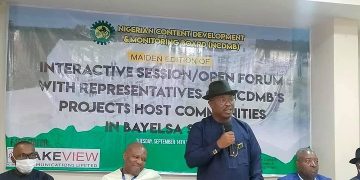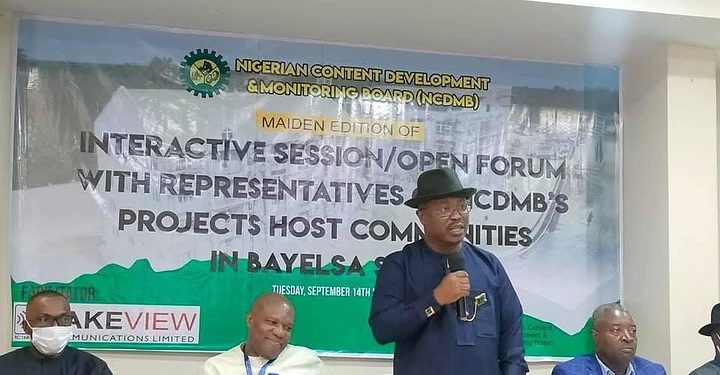By Emmanuel Nduka
The Nigerian Content Development and Monitoring Board (NCDMB) has held the Maiden Edition of the Interactive Session/Open Forum with Representatives of its Projects Host Communities in Bayelsa State.
Delivering a pictorial presentation at the event, the NCDMB Executive Secretary, Engr Simbi Wabote, represented by the Director, Planning, Research and Statistics, of the NCDMB, Mr. Patrick Obah, urged traditional rulers and communities hosting NCDMB projects and infrastructures, to secure and preserve them.
At the event which held at the Harold Dappa Biriye Conference Centre, Onopa, Yenagoa, the ES also used the opportunity to inform the audience of the activities of the Board in the state, as well as their positive impact on Human Capacity Building, Job Creation, Investment Promotion, Infrastructural Development and Partnerships.
He said these were in line with its mandate of developing local capacities and capabilities in the oil and gas industry, monitoring compliance and enforcing provisions of the Nigerian Oil and Gas Industry Content Development (NOGICD) Act.
Speaking on the projects, he clarified that projects like the Rungas Gas composite cylinder manufacturing facility at Polaku, the Azikel modular refinery and Eraskon Lube Oil blending plant, both at Gbarain, were being developed by private promoters with equity investments by the Board.
He further explained that the Board partnered with third party investors with the intention of catalyzing those projects, domiciling critical oil and gas investments, and creating job opportunities, after which it would divest its stakes from the investments
“The NCDMB is the first organisation in Nigeria to create a Community Content document to guide the relations between Oil and Gas Producing Companies and their host Communities,” he noted.
In his goodwill message, the Bayelsa Deputy Commissioner of Police, Mr. Wilfred Afolabi, commended the NCDMB for convening the interactive session and expressed hope that it would curb recurring threats of protests by certain groups against the Board for frivolous reasons.
He added that dialogue and negotiations were the best strategies for resolving issues between corporate organisations and stakeholder groups.




































